SWEDISH SOUTH ASIAN STUDIES NETWORK
SASNET visit to Jönköping and Växjö universities, 19–20 March 2009
Networking is the main purpose of SASNET. A regular feature of our activities is therefore visiting Swedish universities to meet with researchers and educationists involved in South Asia related research and/or educational collaboration projects. In mid-March 2009 SASNET’s deputy director Lars Eklund visited two universities in southern Sweden, Jönköping University and Växjö University.
Visit to Jönköping University, Thursday 19 March 2009
Web page: http://www.hj.se/
– Information about Jönköping University and its internationalisation work
(Article in the magazine Högskriften, Fall 2008)
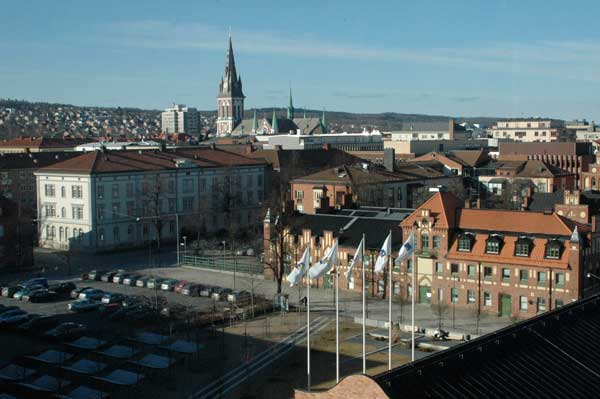 Jönköping University (Högskolan i Jönköping) is a different kind of university. Founded in 1994, it is one out of three Swedish universities controlled by a foundation or a private trust – Jönköping University Foundation. (The other Swedish universities run by foundations/trusts are Stockholm School of Economics, and Chalmers University of Technology in Gothenburg.)
Jönköping University (Högskolan i Jönköping) is a different kind of university. Founded in 1994, it is one out of three Swedish universities controlled by a foundation or a private trust – Jönköping University Foundation. (The other Swedish universities run by foundations/trusts are Stockholm School of Economics, and Chalmers University of Technology in Gothenburg.)
The structure of the university differs accordingly. Instead of being divided into a number of faculties, Jönköping University functions as a parent company institution with a number of independently run subsidiary Schools. Each of them is headed by a Chief Executive Officer (VD), even though the title in the English translation is called Dean.
Jönköping University consists of the following four Schools:
– Jönköping International Business School (Internationella Handelshögskolan, IHH), http://www.ihh.hj.se/
– School of Education and Communication (Högskolan för lärande och kommunikation, HLK), http://www.hlk.hj.se/
– School of Engineering (Tekniska Högskolan i Jönköping, JTH), http://www.jth.hj.se/
– School of Health Sciences (Hälsohögskolan i Jönköping, HHJ), http://www.hhj.hj.se/
Altogether, the university had almost 11 000 registered students in 2008, out of which 1 200 were international students coming from 82 countries, many from India and Pakistan. Jönköping University takes a pride in pointing out its strong commitment to international student exchange. Even though it is not the Swedish university with the maximum number of international students, it is the one with the most developed student exchange in all its educational programmes. This is due to the well-maintained network of partner universities, currently 350, all over the World (including South Asia). In 2007, 35 percent of the university students from Jönköping spent at least one semester abroad through one or another of the many exchange programmes available. At JIBS the figure at some of the programmes was close to 90 percent. The average for other Swedish universities in 2007 was 16 percent.
Meeting with international coordinators
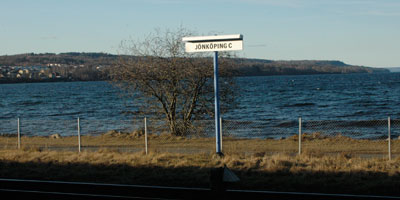 I arrived to Jönköping by train from Lund, and was met at the railway station (beautifully located next to the shores of Lake Vättern) by Dr. Mikael Gustafsson, an oceanographer previously connected to the Dept. of Oceanography, Earth Sciences Centre, Göteborg University but now working at the International Secretariat, part of the so-called President’s Office at
Jönköping University. We walked through the city centre of Jönköping and arrived to the campus area with the four schools, centrally located in town. The University has taken over parts of the industrial area previously dominated by the paper mill company Munksjö AB. Some of the company buildings have been taken over by the university administration, including the International Secretariat where a meeting had been organised for me to present SASNET for the international coordinators and other staff involved in international collaboration projects at the four Schools of Jönköping University.
I arrived to Jönköping by train from Lund, and was met at the railway station (beautifully located next to the shores of Lake Vättern) by Dr. Mikael Gustafsson, an oceanographer previously connected to the Dept. of Oceanography, Earth Sciences Centre, Göteborg University but now working at the International Secretariat, part of the so-called President’s Office at
Jönköping University. We walked through the city centre of Jönköping and arrived to the campus area with the four schools, centrally located in town. The University has taken over parts of the industrial area previously dominated by the paper mill company Munksjö AB. Some of the company buildings have been taken over by the university administration, including the International Secretariat where a meeting had been organised for me to present SASNET for the international coordinators and other staff involved in international collaboration projects at the four Schools of Jönköping University.
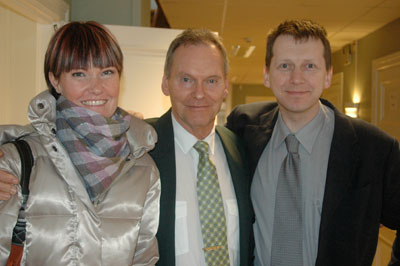 |
| Malin Pallman, Svante Hultman and Mikael Gustafsson. |
The meeting was presided by Dr. Juha Alatalo, Head of the International Secretariat.
Participants in the meeting:
• Mr. Lars Eklund, Deputy director, SASNET
• Dr. Juha Alatalo, International Secretariat
• Dr. Mikael Gustafsson, International Secretariat
• Dr. Svante Hultman, International Secretariat
• Mr. Tomas Bengtsson, Director Student Recruitment, Jönköping International Business School
• Ms. Li Andersson, Project Manager, Jönköping International Business School
• Mr. Karl Hedman, Director of International Relations, School of Health Sciences
• Ms. Malin Pallman, International Coordinator, School of Education and Communication
• Mr. Mikael Palmgren, International Office, School of Engineering
• Ms. Christine Kociuk, Student from University of Windsor, Canada
After an initial presentation of SASNET by Lars Eklund, most of the meeting was devoted to Jönköping University’s ongoing South Asia related collaboration projects. Some of these were already known to SASNET and presented through its website, whereas other projects were less known. Dr. Alatalo gave an overview of the entire Jönköping University, and the representatives from the four schools presented their specific activities.
School of Education and Communication (HLK)/School of Enginering (JTH)
Web page HLK: http://www.hlk.hj.se/
Web page JTH: http://www.jth.hj.se/
After the meeting was concluded, a walking tour was organised around the campus to visit some of the teachers and researchers directly involved in the collaboration projects. The first stop was the School of Education and Communication, HLK (where I also met with Prof. Bo Nordström from the Department of Chemical Technology, School of Engineering).
HLK is responsible for Jönköping University’s teachers training programmes, besides developing research in the fields of media and communication. The School of Education and Communication has the most internationalised teacher training programme in Sweden. International collaboration supports key projects for more innovative activities, new knowledge and new perspectives on teaching and communication. It has strong collaboration projects with two universities in South Asia, Chittagong University in Bangladesh and Pune University in India.
Professor Lars-Åke Engblom is the key person behind the successful collaboration with Chittagong University. A students and teachers exchange programme has been established, and has been evolved into a Linnaeus Palme exchange programme. It has been funded by since 2008, and has recently got continued funding for the period 2009-10.
The project involves teachers and students from the Dept. of Journalism and Media at the University of Chittagong. Unfortunately Prof. Engblom was not in Jönköping on this day, so I could not meet him.
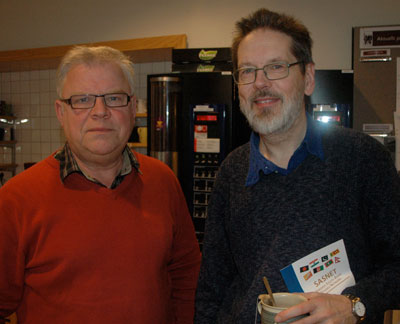 Instead I met the two lecturers Magnus Apelqvist and Per Bergström (on the photo to the right), both from the Section for Natural Sciences, Physical Education and Mathematics. Since 2005 they have been involved in a Linnaeus-Palme
International Exchange Programme in the field of teachers training with the University
of Pune.
The collaboration project between HLK and the University of Pune continues during the period 2009-10.
Instead I met the two lecturers Magnus Apelqvist and Per Bergström (on the photo to the right), both from the Section for Natural Sciences, Physical Education and Mathematics. Since 2005 they have been involved in a Linnaeus-Palme
International Exchange Programme in the field of teachers training with the University
of Pune.
The collaboration project between HLK and the University of Pune continues during the period 2009-10.
The School of Engineering, known to be one of the leading research environments within the field of Materials and Manufacturing Technology in Europe, has also been involved in this collaboration with Pune University. Prof. Bo Nordström has been working closely with the Dept. of Environmental Sciences, Pune University. In November 2007, SASNET’s Director Anna Lindberg and Deputy Director Lars Eklund visited Pune University and met with Prof. Vikram Ghole at the Dept. of Environmental Sciences. Read the SASNET report from Pune University.
– More SASNET information on the School of Education and Communication
– More SASNET information on the School of Engineering
Jönköping International Business School (JIBS)
Web page JIBS: http://www.ihh.hj.se/
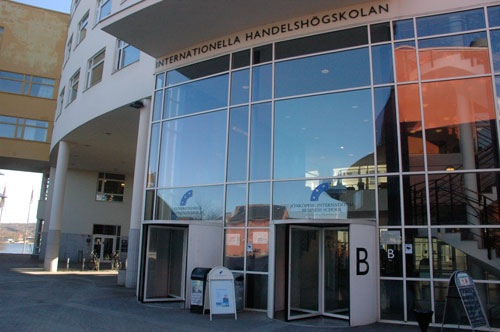 From HLK we proceeded to JIBS in the neighbouring building. JIBS claims that is has the highest number of internationalised activities among all academic institutions in Sweden. Its network of partner universities is global, and strategic collaboration with entrepreneurial partners in other countries includes research projects, study programmes and other development projects. Collaboration partners in South Asia include the Indian Institutes of Management (IIM), for example in Ahmedabad and Bangalore; and Welingkar Institute of Management in Mumbai and Bangalore.
From HLK we proceeded to JIBS in the neighbouring building. JIBS claims that is has the highest number of internationalised activities among all academic institutions in Sweden. Its network of partner universities is global, and strategic collaboration with entrepreneurial partners in other countries includes research projects, study programmes and other development projects. Collaboration partners in South Asia include the Indian Institutes of Management (IIM), for example in Ahmedabad and Bangalore; and Welingkar Institute of Management in Mumbai and Bangalore.
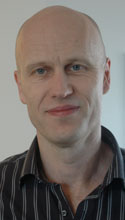 We met with Dr. Tomas Müllern, (photo to the left) Professor in Business Administration and in charge of the educational programmes at JIBS. He presented the collaboration projects that already exist between JIBS and South Asian universities, but also about the major project to set up and run a new technical university in the
industrial town of Sialkot in northern Pakistan. The project has recently been shifted over to Jönköping University from the Royal Institute of Technology (KTH) in Stockholm.
We met with Dr. Tomas Müllern, (photo to the left) Professor in Business Administration and in charge of the educational programmes at JIBS. He presented the collaboration projects that already exist between JIBS and South Asian universities, but also about the major project to set up and run a new technical university in the
industrial town of Sialkot in northern Pakistan. The project has recently been shifted over to Jönköping University from the Royal Institute of Technology (KTH) in Stockholm.
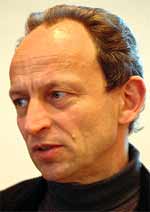 Dr. Ramon Wyss (photo to the right), Professor in Nuclear Physics and former Vice President of KTH, has been in charge of the Sialkot project from the beginning. He has now partly moved to Jönköping University, where he has become Vice-president for International Affairs at JIBS.
Dr. Ramon Wyss (photo to the right), Professor in Nuclear Physics and former Vice President of KTH, has been in charge of the Sialkot project from the beginning. He has now partly moved to Jönköping University, where he has become Vice-president for International Affairs at JIBS.
Prof. Wyss is also a key person behind the creation of INSTEC, a national Swedish network centre for Indo-Swedish Cooperation on Technical Research and Education funded by the Swedish Governmental Agency for Innovation Systems, VINNOVA. More information about INSTEC.
The Sialkot initiative originally came from the Pakistani government, which is
eager to boost the number of university graduates in the country,
especially in the sciences. Pakistan has taken upon itself to finance and build the
campus, whereas Swedish partners will be responsible for course content, university
management and quality control. Fields of study are supposed to include
electrical engineering, information technology, chemical engineering,
industrial economics and mechanical engineering. The Sialkot
University should also take in 20-30 PhD students per year. As
for teaching resources, several options have been proposed: Some professors
to be loaned from Sweden, others to be jointly appointed
in Sweden and Pakistan. Pakistani students who acquire master's
and doctoral degrees abroad should also be invited back to teach subsequent intakes
of undergraduate students.
The Swedish involvement in the Sialkot university is part of a larger effort by the Government of Pakistan to improve the quality of higher
education in the country to the benefit of society. International cooperation was invited to establish nine new Universities
of Engineering Science & Technology
in Pakistan (UESTP). France, Germany, Austria, Italy, South
Korea, China and Japan were approached besides Sweden.
The university was supposed to have been fully operational
already by the start of the 2008/2009 academic year, but due to the worsening security situation in Pakistan the KTH board decided to withdraw from the project.
– More SASNET information on Jönköping International Business School
School of Health Sciences (HHJ)
Web page HHJ: http://www.hhj.hj.se/
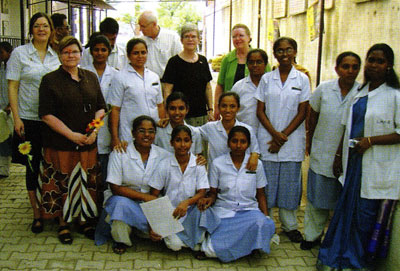 The final stop at Jönköping was the School of Health Sciences where we met Mr. Karl Hedman, Director of International Relations, wha was earlier participating in the meeting at the International Secretariat.
The final stop at Jönköping was the School of Health Sciences where we met Mr. Karl Hedman, Director of International Relations, wha was earlier participating in the meeting at the International Secretariat.
The School of Health Sciences is involved in a Linnaeus-Palme
International Exchange Programme with the Lokmanya Medical Foundation in
Pune, India.
The programme is administered by Ms. Inez Johansson, director of studies for international programmes at HHJ.
The collaboration was established already in late 2007, when a frame agreement for 10 years was signed between Jönköping University and Lokmanya Foundation. The main point is accreditation of nursing training programmes, but in the coming years the collaboration will also include specialist training in anaesthesia for nurses, and a Masters programme in leadership. The collaboration project has received continued funding for the period 2009-10.
In February 2008 a delegation from Lokmanya Foundation consisting of the two lecturers Sonali Adwait and Ashwini Dattatray visited Jönköping, and a month later a delegation from Jönköping went to Pune. This delegation was led by Professor Gerd Ahlström, Dean of the School of Health Sciences. (see also the photo above, by Joachim Göransson)
Visit to Växjö University, Friday 20 March 2009
School of Humanities
Web page: http://www.vxu.se/hum/
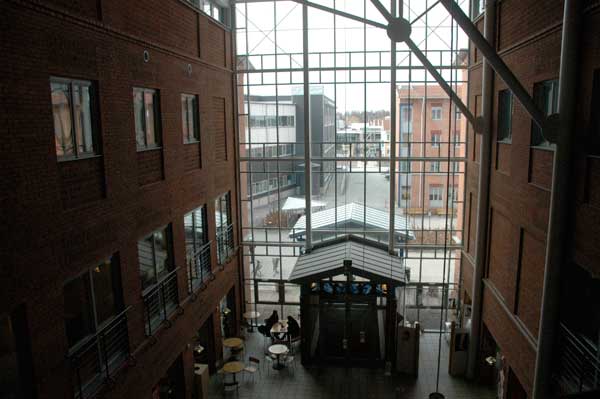 I proceeded to Växjö University to continue the networking tour to meet researchers and teachers involved in South Asia related collaboration. My visit coincided with the visit to Växjö University by Dr. Ashis Sengupta, Professor of English at North Bengal University in Siliguri, India.
I proceeded to Växjö University to continue the networking tour to meet researchers and teachers involved in South Asia related collaboration. My visit coincided with the visit to Växjö University by Dr. Ashis Sengupta, Professor of English at North Bengal University in Siliguri, India.
He was invited to hold open lectures at three Swedish universities during the period 20–26 March 2009. The lecture tour, also including Mälardalen University in Västerås and Dalarna University in Falun, was financed by a SASNET guest lecture programme grant.
In Växjö, Prof. Sengupta lectured about ”Gender and Sexuality in Contemporary Indian Drama in English”, on Friday 20 March for students at the School of Humanities on an invitation by Prof. Margareta Pettersson, Dept. of Comparative Literature, and Prof. Maria Olaussen, Dept. of English.
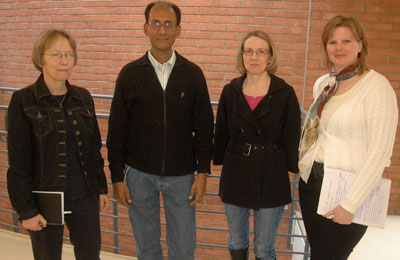 |
| Margareta Pettersson, Ashis Sengupta, Maria Olausson and Piia Posti. |
After the seminar, a meeting was organised for to discuss SASNET and what it can offer, and for the hosts to present the South Asia related activities at the School of Humanities. Besides Margareta Pettersson and Maria Olaussen, Dr. Piia Posti, Dept. of English also participated in the meeting.
They informed about the network for postcolonial studies, Postkolonialt Forum i Sydost, that has existed since 2007. The forum has members at three universities, Växjö, Kalmar and Blekinge. Approximately 20 people are involved in its activities consisting of interdisciplinary research seminar series every semester connecting scholars on Literature, History, Political Science and other subjects. It has resulted in a vibrant exchange of ideas. Piia Posti is the coordinator of the network. It is funded by grants from Crafoord Foundation and STINT. Piia Posti is the coordinator of the network. More information about Postkolonialt Forum i Sydost.
The School of Humanities have also joined a new Nordic research collaboration project on ”Postcolonial Literatures in English” through the so-called Nordplus Framework Programme, a funding programme administred by the Nordic Council of Ministers aimed at strenghtening educational collaboration between universities in the Nordic and the Baltic states. The collaboration involves the University of Växjö; University of Aarhus, Denmark; Joensuu University, Finland; and University of Bergen, Norway. The project will start working from 2010.
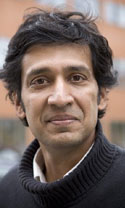 A key person in this project is Associate Professor Tabish Khair (photo to the right) at the Department of English, University of Aarhus.
Born and educated mostly in Gaya, India, he is the author of many books.
Previously a journalist with the Times of India, Khair also continues to write and review occasionally for papers in different countries. In particular, he writes for the Hindu (India) and the Guardian (UK).
Other Routes, an anthology of pre-modern travel texts by Africans and Asians, co-edited and introduced by Khair (with a foreword by Amitav Ghosh) was published in the UK and USA in 2005 and 2006 respectively.
Khair's latest novel, FILMING: A Love Story (2007), examines memory and guilt against the backdrop of the Partition and the 1940s Bombay film industry. A paperback edition came out late in 2008. More information on Tabish Khair’ private web page.
A key person in this project is Associate Professor Tabish Khair (photo to the right) at the Department of English, University of Aarhus.
Born and educated mostly in Gaya, India, he is the author of many books.
Previously a journalist with the Times of India, Khair also continues to write and review occasionally for papers in different countries. In particular, he writes for the Hindu (India) and the Guardian (UK).
Other Routes, an anthology of pre-modern travel texts by Africans and Asians, co-edited and introduced by Khair (with a foreword by Amitav Ghosh) was published in the UK and USA in 2005 and 2006 respectively.
Khair's latest novel, FILMING: A Love Story (2007), examines memory and guilt against the backdrop of the Partition and the 1940s Bombay film industry. A paperback edition came out late in 2008. More information on Tabish Khair’ private web page.
– More SASNET information on the School of Humanities, Växjö University
School of Social Sciences
Web page: http://www.vxu.se/svi/
The School of Social Sciences offers educational programmes in the subjects of: • Media and Communication Studies; • Sociology; • Political Science; • Geography; • Physical Geography; • Human Geography; • Social Psychology; • Psychology; and • Peace and Development Studies. The School of Social Sciences have approximately 110 people employed.
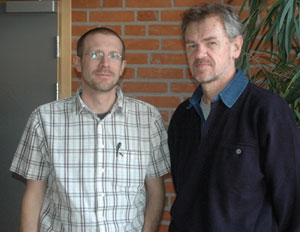 |
| Joacim Martinsson and Krister Håkansson. |
In the afternoon, I met with Professor Krister Håkansson from the Dept. of Psychology within the School of Social Sciences. Besides is also working at Karolinska Institutet Medical University in Stockholm.
We first discussed the conference on ”Implementation strategies for the transfer of hybrid photovoltaic-thermal technology (H-PV/T) from research to lab to field”, that should have been held in New Delhi 25–28 March 2009. It has however been postponed, and new dates will be in the end of August 2009.
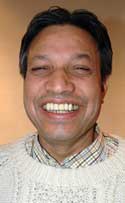 The conference, partly funded by SASNET, should have been organised by Dr. Om Prakash (photo to the left) at the Dept. of Mechanical Engineering, School of Technology and Design,
Växjö University, in collaboration with the Indian Institute of Technology (IIT) Delhi. However, due to bad health Dr. Prakash could not realise the project, and the responsibilty was then handed over to Prof. Krister Håkansson. More information about Dr. Prakash and the Dept. of Mechanical Engineering.
The conference, partly funded by SASNET, should have been organised by Dr. Om Prakash (photo to the left) at the Dept. of Mechanical Engineering, School of Technology and Design,
Växjö University, in collaboration with the Indian Institute of Technology (IIT) Delhi. However, due to bad health Dr. Prakash could not realise the project, and the responsibilty was then handed over to Prof. Krister Håkansson. More information about Dr. Prakash and the Dept. of Mechanical Engineering.
The planned conference is supposed to function as an incitament to introduce solar energy in Indian villages without electricity. Different aspects – technical as well as social and cultural will be discussed. Persons working or having knowledge of solar energy technologies in the area related to agriculture in remote area will be invited to the conference, where participants first learn the technologies with practicals and convinced to desire to work in future with our networking groups, and NGO representatives can share their experience with problem faced by them during implementation of such technologies in rural areas. Tentively the following two future venues for implementation of the project have been proposed, namely one rural area, Ballia in the state of Uttar Pradesh, and one medium-sized city, Varanasi also in Uttar Pradesh.
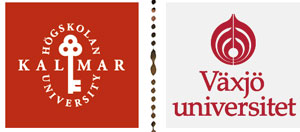 Krister Håkansson had also invited Mr. Joacim Martinsson, Director of Studies at the Media and Communication Studies programme to our meeting. Mr. Martinsson is the Deputy Head of the School of Social Sciences and Chairman of its Internationalisation Committee.
Krister Håkansson had also invited Mr. Joacim Martinsson, Director of Studies at the Media and Communication Studies programme to our meeting. Mr. Martinsson is the Deputy Head of the School of Social Sciences and Chairman of its Internationalisation Committee.
Mr. Martinsson now
informed about the great administrative changes that Växjö University are going through during 2009. On 1 January 2010, Växjö University and Kalmar University will merge, and form what is to be known as the Linnaeus University (Linnéuniversitetet). The organisation of faculties and institutions was decided upon on Thursday 26 March 2009. More information about the new merged university. ![]()
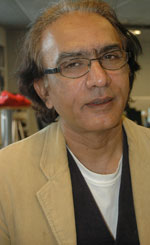 Joacim Martinsson informed about the amount of international students at the university, including from South Asia. No research is however focused on the region so far. But Krister Håkansson was keen on changing this, and maybe a research project involving researchers from the School of Social Sciences can evolve out of the coming conference in India.
Joacim Martinsson informed about the amount of international students at the university, including from South Asia. No research is however focused on the region so far. But Krister Håkansson was keen on changing this, and maybe a research project involving researchers from the School of Social Sciences can evolve out of the coming conference in India.
– More SASNET information on the School of Social Sciences, Växjö University
After the meeting, Krister Håkansson and I went to meet Mr. Mirza Baig (photo to the right), teacher in Human Rights at the Dept. of Legal Studies, School of Management and Economics (Ekonomihögskolan). Mr. Baig comes from Pakistan and has a strong engagement in human rights issues, and would very much like to be involved in a joint Indo-Pakistani-Swedish research project to be planned in collaboration with Prof. Håkansson..
SASNET - Swedish South Asian Studies Network/Lund
University
Address: Scheelevägen 15 D, SE-223 70 Lund, Sweden
Phone: +46 46 222 73 40
Webmaster: Lars Eklund
Last updated
2009-08-20
